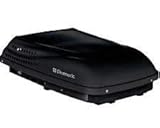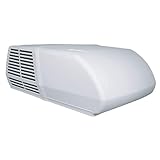Every spring, as people take their RVs out of storage a large population of them run into the same issue… their air conditioner is no longer working!
It doesn’t matter if you have a travel trailer, 5th wheel, or a big Class A motorhome, things are going to break at some point. Unfortunately, a broken air conditioner in your RV can be a real setback in your planning and preparing for a trip.
But don’t stress! We have you covered. After this article, you’ll know what to look for in a replacement, and which one is best for you.
Below, I list out the best air conditioners for your RV. If you don’t know what to look for in an air conditioner, jump further down the page for RV Air Conditioner Buyer’s Guide.
Let’s jump in without wasting any time!
Quick Navigation
5 Best RV Air Conditioners
1. Dometic 651816
- Must Specify Color Choice..727-505-8530
- Pre-Installed CB for CCC2 Tstat ONLY
- Heat Pump/AC operational range--40-110....
This is our top pick because it checks pretty much every box I suggest looking for to be the best RV air conditioner. It has a sleek, low profile, so it’s going to be more efficient in the wind.
It’s 15,000 BTUs, so it has plenty of power for those hot summer days. It uses a more eco-friendly refrigerant that releases heat more efficiently. It’s lighter weight. Plus, it has a heat pump, so it can help you keep warm, as well. It also fits ducted or unducted.
All around, I don’t think this unit can be beat by anything on the market currently.
2. Airxcel Mach 15
- Cool/heat capacity: 15, 000
- Electric heat Element capacity: 5, 600
- Electrical rating: 115 VAC, 60Hz
This one slid in at second place for several reasons. It’s a powerful 15,000 BTUs, so it can handle itself well in warmer camping situations. While it doesn’t come standard with the ability to heat, it does have addon capability to help turn it into a heat as well.
It has a very powerful motor and has been popular for it’s ability to push a lot of air without being too noisy.
It’s not the low profile design we like, but it’s a great bang for the buck unit. Especially for those that aren’t sure yet if they’d use the heating capability, but want the option in the future. Or perhaps you only need the AC for now, but won’t be using the heat for another 6 months, you can spread out the purchase.
3. Dometic 640315C
- Cools with R410A refrigerant that releases heat more efficiently
- Fits Standard 14" X 14" roof openings
- Nominal Capacity, BTU/hr. 13,500
This unit is a lot like the one above in terms of design, it’s just a little less powerful and doesn’t include a Heat Pump.
It’s the same dimensions as the one above, so again, it’s going to be a sleek low profile that won’t stand too tall on top of your rig. However, it has 13,500 BTUs and doesn’t include the Heat Pump.
If you’re not interested in using your unit to heat, then bang for the buck, this a good choice.
4. Dometic Brisk II
- Nominal capacity,15000 BTU/Hour; Installation type: ducted or non ducted
- High-performance motor and fan
- Electrical rating- 115V AC, 60 Hz, 1 Phase
Despite being 4th on the list, this doesn’t make it a bad RV air conditioner, by any means. For a great price, it offers 15,000 BTUs, with a capacity to blow a lot of air.
It is a taller design, but they used that to their advantage by adding larger air openings to pull more air in. This actually increased the air flow by 15% over previous models, while also dropping weight by 19%. Dometic has been making some incredible strides in their offerings.
Despite being taller, it’s actually lighter than our top rated unit above.
5. Airxcel Mach 3
- Cool/Heat Capacity: 13,500
- Electric Heat Element Capacity: 5,600
- Electrical rating: 115 VAC, 60HZ
This is the second most powerful air conditioner in it’s series, so don’t think of this one being ranked 5 out of 5, but more so, 5 out of hundreds.
It’s rated at 13,500 BTUs and can blow 320 cubic feet per minute, so it’s still plenty powerful. Like some of the others on this list, it doesn’t come with heating, but the heating feature is optional, if that’s something you think you might want.
It’s a fairly heavy and bulky unit, so it can be hard to get it up on your roof, if you’re installing it yourself. But, I have yet to come across someone that says the install was hard, once they got the unit on their roof.
What To Look For In An RV Air Conditioner
BTUs
BTU stands for British Thermal Unit. Consider BTUs the measure of power for an RV Air Conditioner. Standard is 13,500 BTUs, but bigger rigs usually have higher, and sometimes multiple ACs all together. For example, I have two 15,000 BTU units on my 5th Wheel.
If you’re going to be using your RV in warm conditions, I recommend no less than 13,500 BTUs. In fact, I’d highly suggest jumping to a 15,000 BTU unit.
If you’re looking at just one unit, keep in mind, it’s working on cooling your entire rig. Plus, it’s not just one big room where pumping air into one space can cool down quickly; we’re pumping air into a series of rooms. If we’re being honest, the insulation isn’t the best in most RVs as well, so the elements win back control pretty quickly.
With all that said, don’t get an underpowered unit. It’s better to have more than you need, than not enough. If you don’t get a strong enough RV Air Conditioner, you’ll burn the new one out quicker and end up spending more money in the long run.
Size and Shape
Aerodynamics is often the name of the game for travel trailers, 5th wheels, and motorhomes, alike. Put simply; the more low profile and sleek a unit is, the less it’s going to cause drag in the air. If you have a tall, bulky unit, it’s going to drag more, reducing your vehicle efficiency, as well as putting more strain on the joints of the unit.
Height also matters. Get too tall and bulky of one, and you’re risking your ground clearance. Our rigs are already super tall, so getting an AC that sticks out further than it should will make that even worse. Replacing a non working AC is one thing, but replacing one that got smacked on a low bridge or hanging tree limb and broke, is something different all together!
Dual Use RV Air Conditioners With Heat Pump
This is a cool one, in my opinion. I see a lot of people asking how to heat their RV without using propane. I had the same question, too. When we’re hooked up and using the campground electricity, we’re not paying for utilities, but we’re burning our propane to run the furnace. So, if we could heat our RV with electricity, we can spend nothing on utilities while hooked up.
We just used our fireplace as heating option #1 and kicked on the furnace when the fireplace couldn’t keep up. When it gets real cold, we can burn through propane super fast. When we were prepping our 5er to leave before a trip, it was down around 0 degrees Farenheit out. We had the heater set pretty modestly to keep the unit from being freezing while we loaded, cleaned, and prepped. Next thing we know, we burned through an entire 20lb tank of propane in that day.
So, when we got our new 5er and I learned it had a 15k BTU with a Heat Pump, I was stoked! A Heat Pump on an air conditioner means it can run in a reverse mode that actually puts out heat. It’s not going to be as hot and powerful as your furnace, but we’ve been using it when it’s down in the 50s at night and getting by just fine with it. Pair that with your fireplace, and you can get by on heating without propane for quite a while.
Weight
Weight is always a consideration with RVs. We’re all limited by capacity in some form or fashion. Most of us have had the calculator out, figuring out exactly where we are in terms of our current weight in relation to our capacity.
RV Air Conditioners can change the weight of your unit. If you’re already pushing towards capacity in your weight, you’ll really need to pay close attention. If you have plenty of room to spare, I suggest paying attention to the weight, but it doesn’t have to be a deciding factor.
Ducted vs Unducted Air Conditioners
You’ll see a lot of mention of ducted or unducted air conditioners. It’s pretty easy to break down the difference.
Ducted – Ducted AC units are controlled by a single control panel inside your RV. The AC unit connects to the ducts that distribute air throughout your rig. Most modern RVs are set up this way. They have vents ducted throughout the various rooms and the AC blows in via those ducts and vents.
Unducted – This one has the control unit attached and they take air from the top of your rig and blow it out the bottom. I like to picture them like the AC units in a lot of hotels. They’re not bad, just most people prefer ducted and ducted seems to spread the cool air around better. Unducted could function just fine in a smaller camper, though.
Final Thoughts
Now you should have a good idea of what to look for in an RV air conditioner, and what will make on better over the other. We’ve also listed out what we consider the top 5.
Facing having to replace your RV AC can be a stressful, but we have you covered.
If you have any questions or recommendations for others, we’d love to hear them. Post them in the comments below!
Last update on 2024-02-26 / Affiliate links / Images from Amazon Product Advertising API




